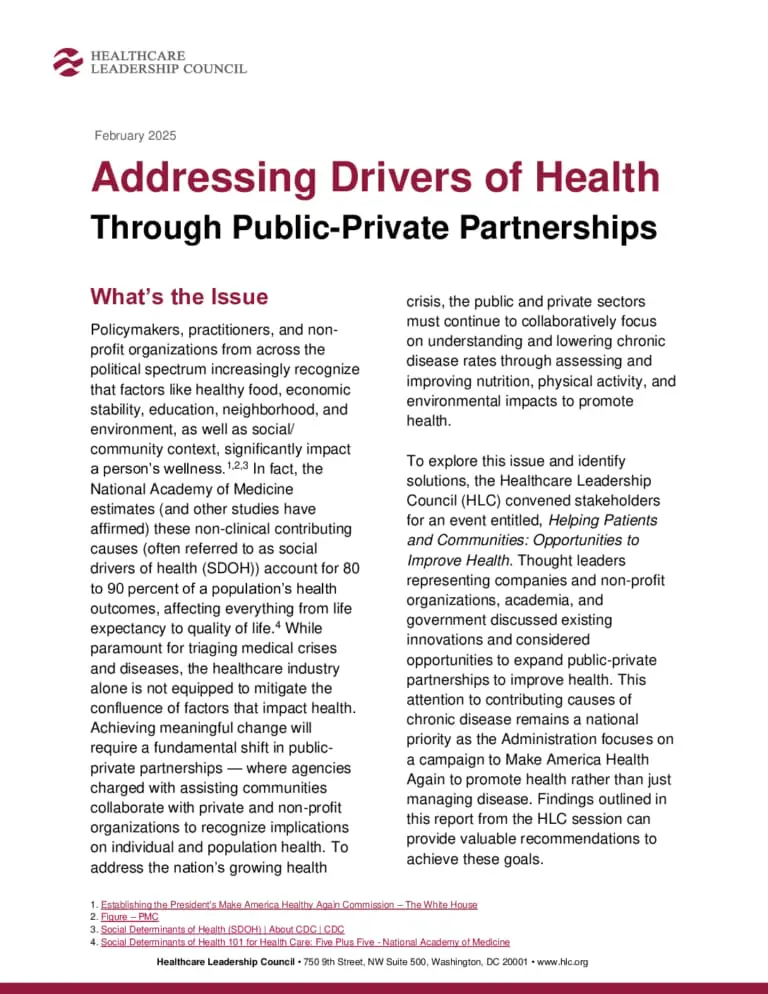Value-Based Care
HLC champions private sector value-based care initiatives and supports federal efforts to drive greater efficiencies in patient care delivery, reduce unnecessary costs, reward collaborative treatment, encourage coordinated care, and improve individuals’ overall health.

The Issue
The U.S. healthcare system is financed predominantly by a fee-for-service (FFS) payment model which compensates providers for the volume of services delivered to patients rather than health outcomes achieved. This model perpetuates misaligned incentives, unnecessary costs, and gaps in patient-centered care. However, public and private-sector initiatives are advancing patient-centered payment models that reward providers for improving health by delivering coordinated, integrated, high-value care.
Policy Solutions
HLC champions a patient-centered approach to healthcare that prioritizes wellness and health, prevents and mitigates chronic diseases, bolsters care coordination, and reduces inefficiencies across the care continuum.
Strengthen Initiatives to Prevent Chronic Disease
Chronic diseases afflict six in 10 American adults, and account for 90% of U.S. healthcare spending. To combat this epidemic, HLC supports prioritizing prevention by improving nutrition, physical activity, and environmental health factors. HLC recommends recognizing long-term budgetary savings, expanding pre-deductible coverage for chronic disease management, advancing interoperable health systems, promoting flexible funding for community-based solutions, and clarifying medical expense definitions in medical loss ratio rules.
Reduce Fraud, Waste, and Abuse (FWA) Through Smart Incentives
Healthcare waste accounts for 25% of total spending and stems from inefficient care delivery, fraud and abuse, and administrative complexity. Strengthening FWA mitigation efforts will reduce unnecessary spending and allow resources to be directed to improve patient care. HLC recommends reclassifying expenses to reduce FWA as quality improvement and enacting the Ensuring Electronic Prescribing for Controlled Substances (EPCS).
Expand Access to Telehealth and Hospital at Home Programs
Telehealth and Hospital at Home flexibilities have benefited Americans nationwide, but private sector organizations are hesitant to invest in the infrastructure these programs require without long-term extensions or permanence. HLC recommends making telehealth flexibilities permanent and extending or making permanent the Acute Hospital Care at Home (AHCAH) Waiver.
Strengthen Incentives for Shared Savings and Accountability
Two-sided financial risk models—where providers share in both the potential savings and the potential losses associated with managing a population’s health—incentivize improved outcomes and cost efficiencies. However, these arrangements require upfront investments, regulatory clarity, and stable incentive structures. HLC recommends establishing a permanent pathway for full-risk Accountable Care Organizations (ACOs), extending the 5% incentive for Advanced Alternative Payment Models (APMs), expanding two-sided incentives across all payers, and reducing barriers to Center for Medicare and Medicaid Innovation (CMMI) model participation.

Addressing Drivers of Health Through Public-Private Partnerships
The attention to contributing causes of chronic disease remains a national priority as the Administration focuses on a campaign to Make America Health Again to promote health rather than just managing disease.
HLC convened thought leaders representing companies and non-profit organizations, academia, and government at an event to discuss existing innovations and consider opportunities to expand public-private partnerships to improve health.
Findings outlined in this report from the HLC session can provide valuable recommendations to achieve these goals.
Value-Based Care Letters & Comments
HLC letter supporting H.R. 4093, the “Apples to Apples Comparison Act”
Read our letter responding to House leaders expressing strong support for H.R. 4093, the Apples to Apples Comparison Act of 2025.
HLC support letter for H.R. 5347, the “Health Care Efficiency Through Flexibility Act”
HLC letter to Congressional Leadership on end of year priorities
Value-Based Care News
HLC Appreciates MedPAC Refining MA Cost Estimates, Urges Further Action
In its status report on the MA program presented on Friday, MedPAC announced revised numbers for its estimates comparing the cost of MA to fee-for-service Medicare (FFS), concluding MA will cost the government 114% of what it would cost if those ben…
HLC Leader on CMMI LEAD Model: “Appreciative of efforts that advance practical, patient-centered care”
Healthcare Leadership Council President and CEO Maria Ghazal released the following statement after the Centers for Medicare and Medicaid Innovation Center (CMMI) unveiled the new Long-Term Enhanced ACO Design (LEAD) model:“When providers are incent…
Fresh Analysis of CMMI Value-Based Care Models Highlights Positive Impact and Areas for Improvement
A new Avalere Health analysis commissioned by the Healthcare Leadership Council (HLC) evaluates the performance of 18 Center for Medicare and Medicaid Innovation (CMMI/Center) payment models revealing opportunities to further improve patient outcome…
Explore HLC
HLC is the only group in Washington that unites healthcare CEOs and leaders across all sectors to shape policy that strengthens the system and improves care.